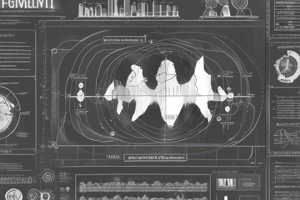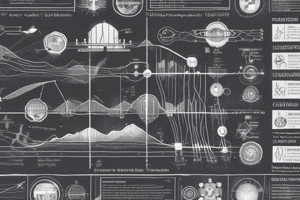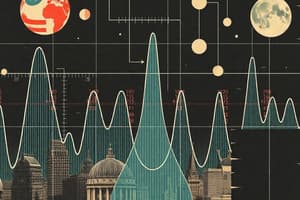Podcast
Questions and Answers
What axis do you find the independent variable?
What axis do you find the independent variable?
X-axis
What axis do you find the dependent variable?
What axis do you find the dependent variable?
Y-axis
What is a controlled experiment?
What is a controlled experiment?
An experiment that only tests one variable at a time while keeping others constant.
What must a hypothesis be?
What must a hypothesis be?
When does a hypothesis become a theory?
When does a hypothesis become a theory?
Define the independent/manipulated variable.
Define the independent/manipulated variable.
Define the dependent/responding variable.
Define the dependent/responding variable.
What are constants?
What are constants?
What is a control group?
What is a control group?
The eight characteristics of life include the ability to __________.
The eight characteristics of life include the ability to __________.
Which of the following is NOT one of the characteristics of life?
Which of the following is NOT one of the characteristics of life?
Define homeostasis.
Define homeostasis.
Flashcards are hidden until you start studying
Study Notes
Reading Graphs
- Independent variable is located on the X-axis.
- Dependent variable is found on the Y-axis.
Experimental Variables
- Independent/Manipulated Variable: The factor that is deliberately changed during an experiment.
- Dependent/Responding Variable: The factor that is measured, which may change in response to the independent variable.
- Constants: All factors in an experiment that are kept the same to ensure a fair test.
- Control Group: The standard of comparison, representing natural conditions not subjected to the experimental treatment.
Hypothesis and Theory
- A hypothesis must be testable and can evolve into a theory if it is repeatedly tested and confirmed by multiple scientists.
Characteristics of Life
- Organisms are comprised of cells.
- They have the ability to reproduce.
- Life is based on a genetic code (DNA or RNA).
- Living things grow and develop over time.
- Organisms obtain and use materials and energy to survive.
- They respond to their environment.
- Life forms maintain internal balance known as homeostasis.
- Evolution: Living organisms undergo change over generations.
Homeostasis
- Defined as the process by which organisms keep their internal environment stable despite external changes.
Studying That Suits You
Use AI to generate personalized quizzes and flashcards to suit your learning preferences.




